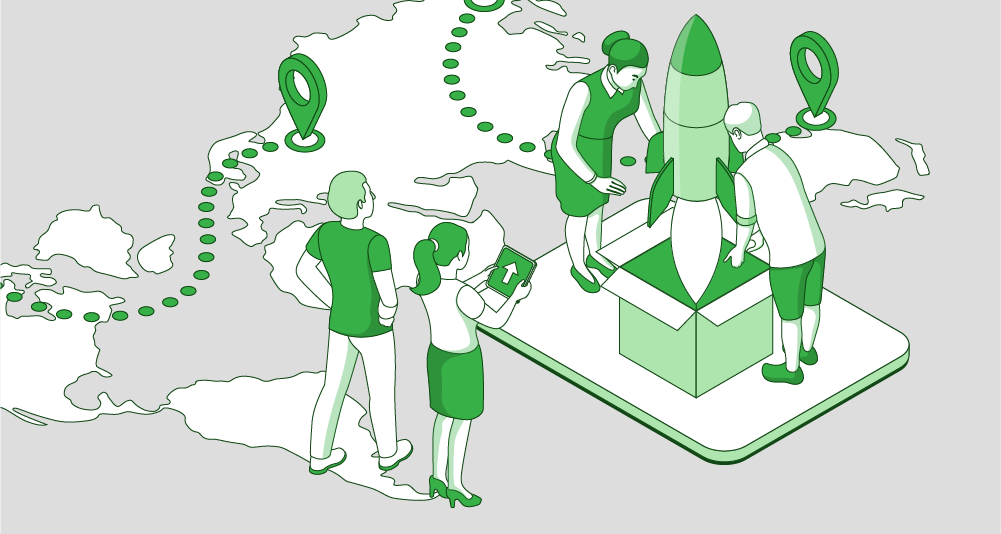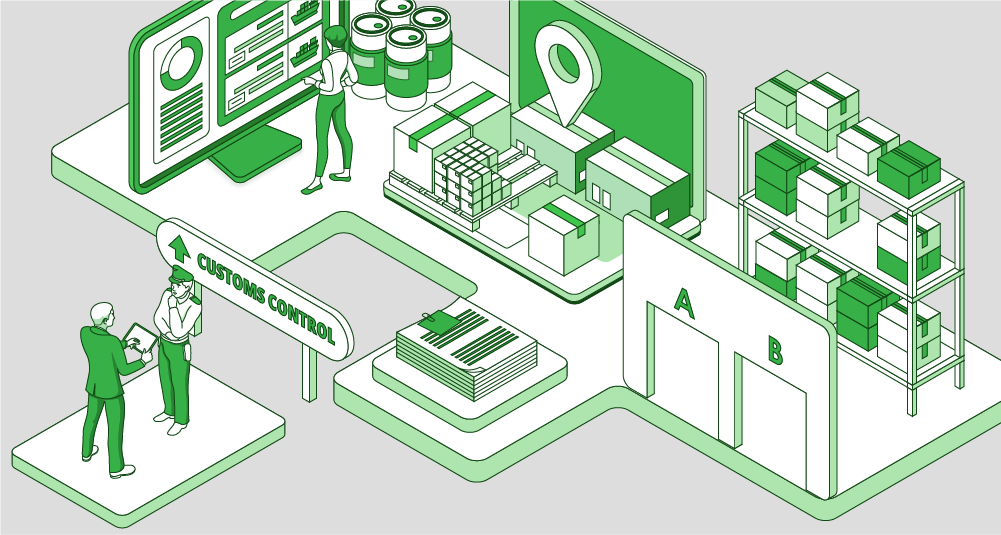The concept of clusters is widely recognized for its important role in fostering the growth of businesses and institutions within a region. Clusters create logistics communities where collaborative efforts drive the creation of valuable products and services. This cooperation yields tangible benefits, ultimately enhancing the competitive edge of individual enterprises and the broader regional economy.
Clusters provide the quality and utilization of internal resources, which directly encompass a skilled workforce, innovation, capital, and transport infrastructure. They are undoubtedly crucial for regional advancement. For instance, a World Economic Forum report by Doherty & Hoyle underscores the critical role of optimized transport networks in reducing carbon emissions. The report highlights that 24% of truck vehicle miles in the EU are empty, and the average utilization of "full" vehicles is only 57%.
To illustrate the significance of these collaborative environments, the WEF report was an external research effort to improve global transportation in the vast array of supply chain sectors. And we will identify and analyze the 10 top logistics hubs and communities from key markets like the US, Europe, and the MENA region, showcasing their unique attributes, collaborative dynamics, and contributions to global growth. In the middle of this article, you will have the opportunity to download the full list of 100+ global logistics hubs, communities, and accelerators.
Top 10 communities, hubs, and coworking spaces in the logistics clusters network
In the increasingly interconnected world of logistics and its communities, clusters play a pivotal role in collaboration. These centers, both regional and global, bring together diverse stakeholders - from established companies and innovative startups to research institutions and government bodies. Together, these companies address logistics industry challenges and create jobs and new opportunities for their participants.
Our list highlights ten leading logistics communities, centers, and coworking spaces in the United States, Europe, and the MENA region. See what they are showing and take a look at their unique contributions to the evolution of logistics.
1. Andalucía Logistics Cluster
Located in the vibrant region of Andalusia, with its heart in Cordoba, Spain, the Andalucía Logistics Cluster is emerging as a dynamic force in the global logistics landscape. Consisting of more than 20 forward-thinking companies, esteemed research institutions, and supportive public authorities, the cluster is an outgrowth of logistics innovation and the development of sustainable supply chains.
Its strength lies in its commitment to project collaboration, fostering a rich environment for knowledge exchange, and encouraging active participation in logistics industry events. With a clear vision to cultivate a sustainable and innovative logistics ecosystem throughout Andalusia, the cluster is an attractive regional growth and progress model.
Website: https://cadenaser.co
2. AstroLabs
A leading technology hub in Dubai, UAE, AstroLabs functions as both a dynamic coworking space and a powerful accelerator. With a thriving community of over 1500 members, it focuses on supporting startups with multimodal capabilities and entrepreneurs in sectors such as technology, logistics, and eСommerce.
Provides essential resources, including coworking spaces, comprehensive acceleration programs, valuable mentorship opportunities, and assistance with company registration. As a key player in the MENA region, AstroLabs empowers startups with the tools and network needed for significant economic growth and successful market entry.
Website: https://astrolabs.com
3. City Logistics Innovation Campus (CLIC)
Located in Amsterdam, Netherlands, the City Logistics Innovation Campus (CLIC) serves as a cutting-edge innovation and top logistics hub and coworking space dedicated to the future of urban logistics problems. While the number of members is currently unknown, CLIC focuses on key factors such as urban logistics, sustainability, inventory management, and digitalization, bringing together startups, established logistics companies, and research institutions.
The campus offers a diverse range of flexible office and warehouse spaces, well-equipped conference rooms, relaxing areas, and valuable partner network access. CLIC provides a broad selection of logistics hubs, adaptable commercial spaces, and contemporary office buildings with customizable layouts, extended-stay options, and event venues.
Website: https://citylogisticscampus.com

4. Digital Hub Logistics Hamburg
The Digital Hub Logistics Hamburg functions as a dynamic innovation logistics hub and coworking space in Hamburg, Germany. It boasts a thriving network of over 60 startups and more than 100 partners and experts, all focused on driving innovation in logistics, digital transformation, and sustainability.
The logistics hub serves as a central meeting point for startups, SMEs, corporations, and research institutions, offering a range of resources including coworking spaces, engaging events, supportive programs that help lower transportation costs, and provides valuable access to its extensive partner network. It provides an ideal environment for work, networking, and collaborative projects among key players in the logistics ecosystem.
Website: https://www.digitalhub.hamburg
5. Impact Hub
Operating as a global network with a significant presence in Vienna, Austria, and over 100 other logistics hubs across more than 50 countries, Impact Hub serves as a central gathering point for innovation and coworking. This extensive network unites a diverse community focused on social innovation, sustainability, and entrepreneurship, including startups, social entrepreneurs, and research institutions.
Impact Hub provides its members access to collaborative coworking spaces, insightful events, a valuable partner network, and various support programs. It fosters a robust ecosystem that enables social entrepreneurs and innovators worldwide to connect, share ideas, and work together to create positive change.
Website: https://impacthub.net
6. LogiVille
Located in Niel, Belgium, LogiVille is a prominent innovation center and a demonstration global logistics hub dedicated to advancing logistics. While the exact number of participants is not specified, it focuses on driving logistics innovation, promoting cutting-edge supply chain technology adoption, and fostering sustainable logistics solutions. LogiVille links startups, established logistics companies, technology providers, researchers, and logistics industry professionals.
It offers unique access to demonstration facilities, valuable networking events, opportunities for collaboration with logistics industry experts, and exposure to the latest advancements in logistics technologies. As a central platform for companies, LogiVille facilitates the showcasing and testing of innovative solutions, ultimately aiming to enhance supply chain efficiency and sustainability across the sector.
Website: https://logiville.be

7. The GrEEK Campus
The GrEEK Campus is a prominent tech hub and dynamic coworking space in the vibrant city of Cairo, Egypt. It fosters a thriving community of over 450 companies and 3,500 members with a strategic location in the region. They are primarily focused on technology, startups, and digital transformation.
The campus provides essential resources for startups and entrepreneurs, including collaborative coworking spaces, engaging events, access to a valuable partner network, and supportive programs designed to facilitate growth. By offering access to mentorship and a strong network of professionals, The GrEEK Campus plays a crucial role in empowering allowing businesses to flourish within the region.
Website: https://www.thegreekcampus.com
8. TradeSpace
Located in Calgary, Canada, TradeSpace offers innovative co-warehousing and coworking solutions. While the exact number of users is not specified, it caters to the needs of small and medium-sized businesses, online retailers, and logistics startups operating in sectors like logistics, e commerce, and warehousing services.
TradeSpace is an emerging logistics hub that is reaching major markets and provides flexible warehouse and office spaces with essential features such as loading docks, conference rooms, comfortable lounge areas, and convenient 24/7 access. By seamlessly integrating warehouse and office facilities with logistics support, TradeSpace delivers adaptable business solutions for diverse enterprises.
Website: https://www.gotradespace.com
9. The Trampery
Based in London, UK, The Trampery is a dynamic coworking and innovation logistics hub that supports approximately 300 individuals across 60 diverse ventures. Notably, it focuses on fostering startups in sustainable transport and logistics alongside technology.
The Trampery offers a range of workspace solutions, a global hub, including coworking areas and private offices, hosts various events, and provides valuable support programs. Renowned for its innovative spaces, The Trampery actively cultivates community development among its members, particularly within the sustainable transport and logistics sectors.
Website: https://thetrampery.com
10. The Loading Dock
The Loading Dock cultivates diverse and collaborative work communities that foster open-minded work and inspire a culture of social responsibility. As a certified B Corp, it is committed to using business as a force for good, believing that profitable businesses can invest in their communities and create a more just, equitable, and sustainable world. With 1,200 members and growing, the goal is to cultivate leaders who leverage business profitability. They also organize public events to further their mission and engage the broader community.
This is achieved through concrete commitments: local purchasing including minority-owned businesses, diverse hiring, and donating 2 percent of revenue to local nonprofits. They're also offering quarterly volunteer opportunities for staff, encouraging member engagement and professional development for employees and members, and prioritizing environmental sustainability.
Website: https://www.theloadingdock.com
✅ Download the full list here

What is a logistics cluster, and what is its importance for the logistics industry?
A logistics cluster is a geographically concentrated network of interrelated companies and institutions. Often, clusters are potentially local authorities involved in logistics, such as Chambers of Commerce abroad. It is characterized by cooperation to achieve common goals and gain a competitive advantage. These clusters can evolve from existing networks or form by aggregating "logistics resources."
Moreover, they enable resource sharing, operational efficiencies, and progress for logistics service providers. It's important to highlight that they seek to minimize costs and/or improve customer service. Convenient strategic location and infrastructure often drive their formation, supporting regional and global supply chain management.
In short, the key characteristics of a logistics cluster are as follows:
Collaborative environment. Members of the cluster cooperate and collaborate to achieve shared goals that meet specific logistics and operational requirements. This collective effort enhances their ability to produce and deliver products and services effectively.
Competitive advantage through synergy. By aligning the activities of individual entities, the cluster generates synergy that creates both quantitative and qualitative benefits, strengthening the competitive position of companies and the region as a whole.
Evolution of existing logistics networks. Logistics clusters often represent a natural evolution of traditional logistics networks, incorporating new business entities, local economies, and government stakeholders to enhance production, distribution, and supply chain sectors.
Resource optimization. Formed by organizations with significant logistics assets such as warehouses, transport fleets, and skilled personnel clusters, focus on optimizing shared resources, skills, and experiences to gain a competitive edge.
Organized and connected networks. Clusters are built upon structured networks that facilitate internal cooperation and allow members to maintain and grow their competitive capabilities. These networks may offer a mix of complementary and even competing logistics services.
Platform for technological and organizational progress. Catalyzing innovation, logistics clusters support the transition from traditional logistics centers to advanced logistics platforms, promoting technological upgrades and organizational efficiency.
Operational efficiency and shared success. Through effective resource sharing and coordination, clusters drive efficiency and effectiveness in logistics operations. The success of individual logistics firms contributes to the overall performance and reputation of the cluster.
Strategic goals. Clusters aim to achieve key logistics objectives, such as reducing costs while maintaining high levels of customer service and enhancing service quality without incurring excessive costs.

Communities as drivers and catalysts for logistic clusters success
In the context of industrial and logistical agglomerations, a cluster refers to a geographical concentration of essentially interconnected companies and institutions. This phenomenon is primarily driven by the economic benefits of proximity.
The benefits of working with clusters or being part of them include increased knowledge sharing and the development of specialized workforces. The main point is the strong creation of a solid supplier base, job creation, along with the stimulation of both competition and cooperation. These aspects ultimately foster innovation and productivity.
Physical strategic location is a defining feature of clusters, facilitating a variety of spillover effects. Moreover, clusters offer significant potential for the development of supporting infrastructure and institutions, the attraction of specialized resources, and the strengthening of the region's industrial identity.
While a cluster is primarily a spatial and economic construct, a community in this context also has a social and relational dimension. It is characterized by common interests, interaction, and a sense of belonging among co-located units.
Although a cluster can exist without a strong community, the development of one can significantly enhance the benefits of agglomeration by fostering trust, cooperation, and collective learning. This social cohesion improves knowledge exchange, strengthens cluster identity, and can help mitigate some of the negative externalities sometimes associated with spatial concentration.
Therefore, although not synonymous, a strong community within a cluster acts as a catalyst, further amplifying its positive effects.
Are you in search of a reliable tech partner?
Adexin can help with advanced logistics solutions
Contact usFinale takeaway
The emergence and growth of logistics communities and clusters worldwide underscores the critical importance of collaboration in driving growth and innovation. It's all about the efficiency and sustainability within the global supply chain. These geographically focused networks, clearly exemplified by the highlighted top 10. These foster synergies among various stakeholders, including custom logistics software providers. Research institutions and public authorities also play a very significant role in this area.
If you want to learn more about the broader logistics cooperation space, download our free list. It includes a comprehensive list of 100+ global logistics hubs and communities around the world, and it can help you discover more partnership and development opportunities.

